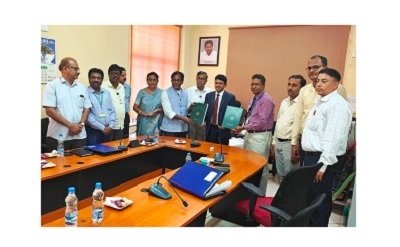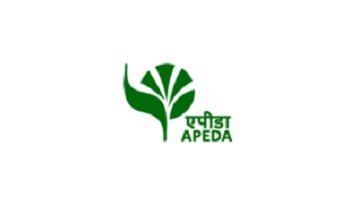33 GI agricultural products from 12 states were displayed at the fair
Agricultural & Processed Food Products Export Development Authority (APEDA) launched a variety of millet products for all age groups at affordable prices ranging from Rs 5 to Rs 15 at the AAHAR food fair.
All the millet products launched by APEDA are gluten-free, 100 per cent natural and patented. The launched products are cream biscuits, salt biscuits, milk biscuits, ragi peanut butter, jowar peanut butter, jowar upma, pongal, khichadi and millet malts (jowar, ragi, bajra).
APEDA also launched a variety of “Millet in Minutes” products under the category of Ready-to-Eat (RTE) such as Upma, Pongal, Khichadi, Noodles, Biryani, etc, which is a breakthrough in the food sector as it’s the first RTE millet product in the market to cater fast-paced world at their convenience in a healthy way.
All the RTE products are vacuum processed without any additives, fillers and preservatives. Nutrition value is retained as original with a shelf-life of 12 months in ambient temperature.
The APEDA is also working in collaboration with the Department of Agriculture and Farmers Welfare to increase cultivation area, production and productivity of millets, including bajra, jowar and ragi.
The 36th edition of AAHAR was jointly organised by APEDA and the India Trade Promotion Organization (ITPO) at Pragati Maidan. In view of the nutritional value of the millets, the government has notified millets as nutri-cereals in April, 2018. The millets are a rich source of protein, fibre, minerals, iron, calcium and have a low glycemic index. In March, 2021, the United Nations General Assembly (UNGA) has declared 2023 as International Year of Millets.
In line with the theme of APEDA’s pavilion, – ‘To promote GI products for export’, the apex body to promote agricultural products put on display 33 GI agricultural products at AAHAR. The APEDA also released two booklets which include a catalogue on Agri and Food GI products (APEDA scheduled) and a brochure on Indian GI mangoes.
The 33 GI products which were on display to attract the attention of over 100 buyers from 40 countries are Punjab’s Basmati Rice, Karnataka’s Gulbarga Tur Dal, Maharashtra’s Sangli Raisin, Kolhapur Jaggery, Ajara Ghansal Rice, Sindhudurg & Ratnagiri Kokum, Vengurla Cashew and Waigaon Turmeric; Assam’s Boka Chaul, Joha Rice, Karbi Anglong Ginger; Manipur’s Chak-Hao and Kachai Lemon, Mizoram’s Ginger and Chilli, Sikkim’s Large Cardamom, Nagaland’s Naga Mircha, Kerala’s Navara Rice, Pokkali Rice, Kaipad Rice, Palakkadan Matta Rice, Himachal Pradesh’s Kala Jeera, Chulli Oil, West Bengal’s Gobindabhog Rice, Tulaipanji Rice, Bardhaman Sitabhog, Bardhaman Mihidana, Banglar Rasogolla, Rajasthan’s Bikaneri Bhujia and Odisha’s Kandhamal Haladi.
AAHAR is a part of the series of export promotion initiatives taken by APEDA, which works under the Ministry of Commerce and Industry, to showcase agricultural and processed food products to the global players in the food and beverages industry as the fair is visited by a large number of importers from different parts of the world.
Apart from AAHAR, APEDA also organises national events like Organic World Congress, BioFach India, etc to promote agri-exports. Notably, more than 150 food and agri Products have been registered as GI by the GI Registry till March 2022, out of which 123 GI products fall under APEDA’s category.
Also, APEDA created dedicated stalls for exporters from North East Region (NER) and Himalayan states/UTs like Jammu & Kashmir, Ladakh, Uttarakhand and Himachal Pradesh, women entrepreneurs, Farmer Producers Organizations (FPOs), Start-Ups and exporters of millets and millets products. More than 40 participants participated under these categories and each category will have dedicated stalls in the APEDA pavilion.
33 GI agricultural products from 12 states











